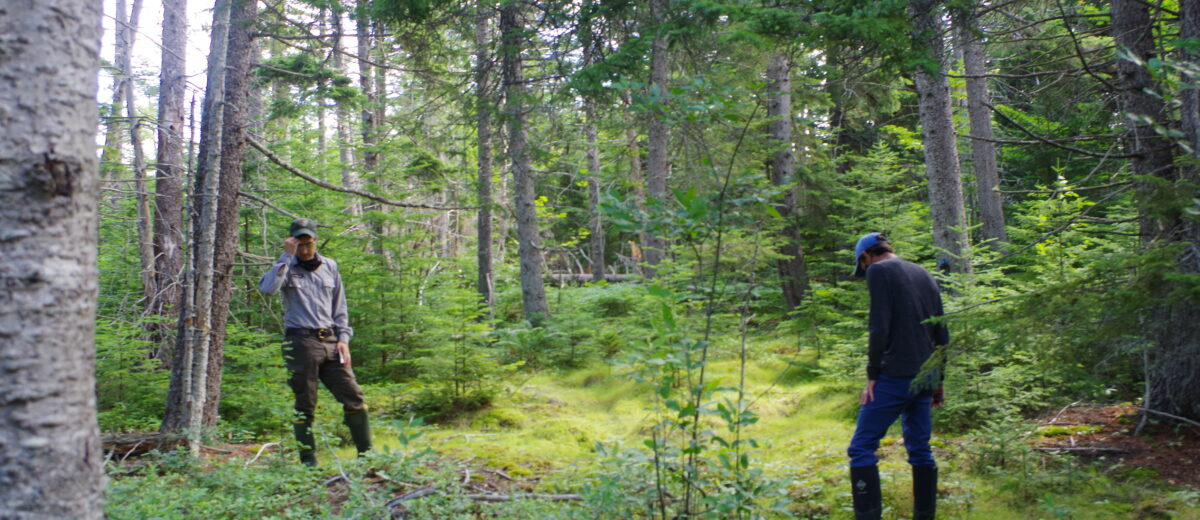by Catherine Schmitt
Climate change is forcing national park managers into difficult decisions about how to keep parks “unimpaired” amid warming temperatures, shifting seasons, and altered precipitation patterns. Instead of trying to preserve parks as they are and have been, managers are having to do triage, as was highlighted in a recent New York Times article and the On Point radio program.
Schoodic Institute has been a leader in helping national parks develop approaches to address this challenge, conducting science to help managers respond to changes taking place in Acadia National Park, and across the National Park System.
Recently, President & CEO Nicholas Fisichelli co-authored the decision framework RAD: Resist, Accept, Direct report (which is cited in the Times article). Fisichelli and the National Park Service (NPS) team began developing the framework in 2015, building on earlier efforts such as Climate-Smart Conservation (recently updated to NPS-specific guidance).
“We realized we needed to be really explicit about the full range of responses to climate change, to get beyond just reacting or automatically resisting all changes,” said Fisichelli.
The team published several peer-reviewed articles, one seeking to clarify the definition of “resilience” and similar terms, and another celebrating George Perkins Marsh for his conservation vision and discussing current responses to the climate crisis Marsh portended. The NPS report on the RAD decision framework was released in December 2020.
According to Fisichelli, their work was not universally well-received at first, but the pace of change has forced many in resource management to reconsider the status quo.
“Climate change is shifting the underlying conditions of ecosystems such that the future will not look like the past. Managers are now really seeing this on the ground and it is forcing a paradigm shift in conservation: manage for continuous change, rather than for static conditions,” he said.
“The Resist-Accept-Direct approach is getting attention across NPS, and much of Schoodic Institute’s science and our work in Acadia National Park fits within this framework, as Acadia National Park Science Coordinator Abe Miller-Rushing described in the Times article,” said Fisichelli.
Related research at Schoodic includes the Tree Test Beds, where 19 tree species were planted together at four sites in the park to test the potential to transplant trees from southern locations as a management response to changes in Acadia’s forests. The trees are species that are currently present in Acadia, or are projected to have suitable habitat here in the coming decades. This study complements a new tool developed by NPS to assess the risk of transplanting species in response to climate change.
Second Century Stewardship Fellows have also been contributing important science to help Acadia and other national parks respond to changing ecosystems. Jenny Smetzer mapped climate change refugia in Acadia, areas where northern species may persist and thus may be important areas to protect and resist change. Chris Nadeau is assessing the effectiveness of directing change in the plant species used to restore habitat on Cadillac Mountain. And Alessio Mortelliti studied some of the unexpected hurdles that other species, like seed-eating squirrels and voles, may pose for some new trees as they arrive in Acadia.
The Landscape of Change project with Mount Desert Island Historical Society and other partners, ongoing bird monitoring, and intertidal work are helping us understand how much the biodiversity in Acadia have already and continue to change.
“We greatly value our partnership with Schoodic Institute and their work at the cutting edge of climate change adaptation,” said Acadia National Park Superintendent Kevin Schneider. “Staff at Schoodic Institute are leading the science to help us respond to change in Acadia National Park and to help park managers across the country.”
Schoodic Institute is continuing to advance climate change adaptation work here in Acadia and with parks and partners across the region and nation. During summer 2021, Schoodic Institute staff and Second Century Stewardship fellows will continue their research to inform restoration of native plants on Cadillac Mountain and at Great Meadow and Bass Harbor Marsh, as part of the Friends of Acadia-led Wild Acadia initiative. Along the coast, work is expanding to understand how intertidal species ranges are changing, and why.
To find out how you can participate in and learn more about these projects, subscribe to the Schoodic Institute monthly newsletter.
